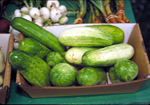| Sustainable Food Guide | Environmental Practice at Work © 2005  |
Issues | Organic Issues.. There are two main concerns: 2. Whether the food that is produced using so many artificial inputs is good for us. People are worried about the pesticide or veterinary product residues remaining in the food and in the relatively narrow range of nutrients left in the food. 'Organic farming' takes local soil fertility as a key to successful production. The natural capacity of plants and animals is encouraged to improve the quality of all aspects of agriculture and the environment. Organic farmers rely on life processes - hence 'organic'. For more about what 'organic' means - Henry Doubleday Reseach Association. 'Organic food' commonly means food that is free from artificial fertilisers or pesticides. However, the organic standards governing products claiming to be 'organic', also cover related concerns, such as animal welfare and being GM free. |
| Photos courtesy of http://www.usda.gov |


